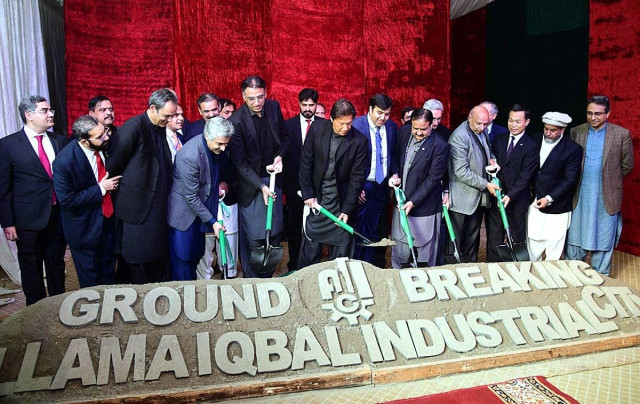Chinese industries to relocate in Pakistan: PM
Imran performs groundbreaking of Allama Iqbal Industrial City in Faisalabad

Chinese industries to relocate in Pakistan: PM
Prime Minister Imran Khan on Friday said Special Economic Zones (SEZs) would create the opportune environment for Chinese industries to relocate to Pakistan.
“[Chinese] Premier Li [Keqiang] has assured me that they would send Chinese industries to us if we create the right environment,” the premier said at the groundbreaking ceremony of the Allama Iqbal Industrial City in Faisalabad.
The industrial city, planned over 4,000 acres, is a mega project of the Faisalabad Industrial Estate Development and Management Company’s (FIEDMC) SEZ and being established under the China-Pakistan Economic Corridor (CPEC).
“This [SEZs] is not only important because the Chinese are ready to invest in our country, but also because they will transfer their technology to us, increase our productivity and set up technical institutes,” PM Khan said after unveiling a plaque to launch the construction of the project.
The prime minister pointed out that Vietnam had greatly benefited by drawing Chinese industries, increasing its exports, GDP and wealth.
The Allama Iqbal Industrial City is one of nine SEZs planned under the CPEC Industrial Cooperation Framework.
Three of them, Allama Iqbal Industrial City, the Rashakai SEZ in Khyber-Pakhunkhwa and Dhabeji SEZ in Sindh, have been declared prioritised SEZs by the governments of Pakistan and China.
The mega project in Faisalabad is expected to create 300,000 jobs for the people of Punjab in the next five years and attract an investment of around Rs400 billion in automobiles, value-added textiles, engineering, pharmaceuticals, food processing, chemicals, construction materials, FGCG and packaging sectors.
It will contribute to the country’s GDP, increase exports and encourage import substitution.
The prime minister said poverty alleviation in the country was only possible by doing away with the anti-investor mindset and promoting wealth creation through industrialisation.
He noted that the country was moving towards industrialisation until the 1960s when an anti-investor mindset and policies were promoted.
“Industrialisation is inevitable as the agricultural sector alone cannot produce enough jobs for the country’s youth,” he added.
“Pakistan will follow the successful Chinese model of allowing wealth creation that has allowed China to steer around 700 million people out of poverty within three decades.”
The premier termed the establishment of first SEZ in Punjab a giant leap towards the accomplishment of his government's vision to alleviate poverty through industrialisation.
He also stressed the need for giving special attention to increasing exports and agricultural productivity and promoting tourism to truly exploit the existing potential.
Federal Planning Minister Asad Umar, Adviser to the Prime Minister on Commerce Abdul Razzak Dawood, Punjab Chief Minister Usman Buzdar, Punjab Governor Chaudhry Muhammad Sarwar, provincial ministers and FIEDMC Chairman Mian Kashif Ashfaq also attended the ceremony.
The FIEDMC chairman briefed the prime minister about the project.
Speaking at the event, Mian Kashif Ashfaq said around 3,317 acres had been acquired for the industrial city.
“Deals have been signed for the sale of 700 acres of this land and many local and foreign investors are in touch with us,” he added.
“Twelve companies which have purchased land here [in the industrial city] will be handed over possession this month so that they can build their units.”
The FIEDMC chairman further elaborated that 400 industries would be set up in the industrial city with an investment of Rs400 billion, providing jobs to over 0.3 million people.
“When I became the FIEDMC chairman, several investors contacted me but there was no land for them here. Now there is land [the industrial city] available that has an infrastructure, gas and other facilities.”



















COMMENTS
Comments are moderated and generally will be posted if they are on-topic and not abusive.
For more information, please see our Comments FAQ